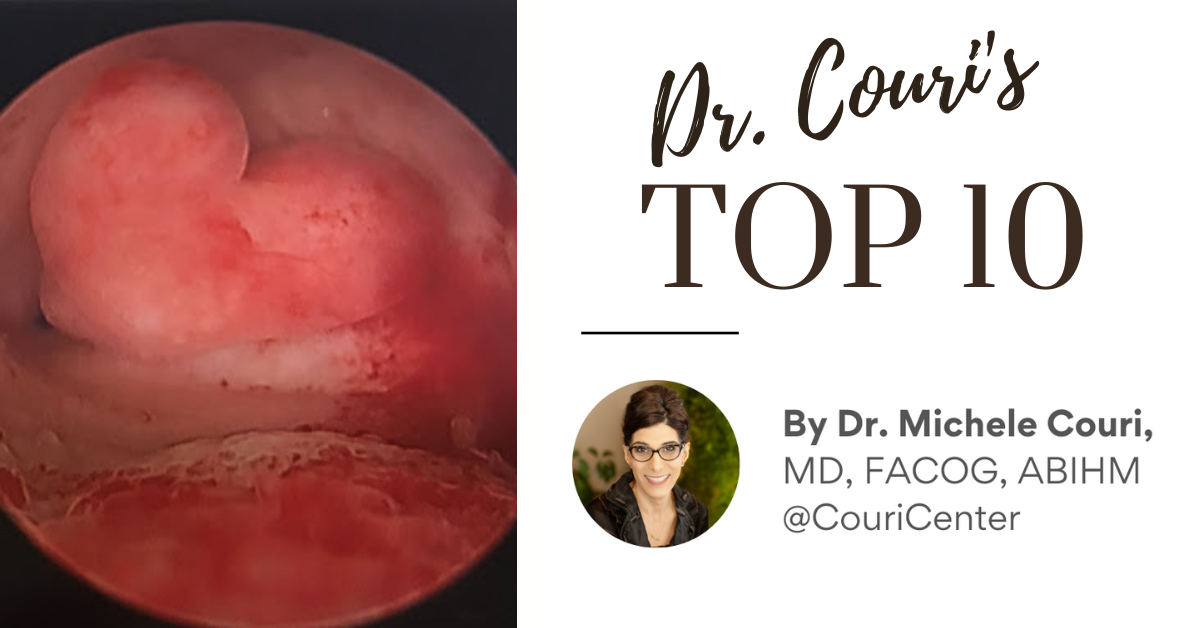
Dr. Couri’s TOP 10: Uterine Polyps
- Uterine polyps are abnormal but very common growths inside the uterine cavity. They arise from the uterine lining (endometrium) and are typically benign. A small percentage of uterine polyps may contain atypical or malignant cells.
- Polyps of the lower reproductive tract, including the cervix and uterus, occur in 7.8-50% of women.
- Despite the vast majority of uterine polyps being benign, roughly 1% of polyps in premenopausal women and 4.9% of polyps in postmenopausal women will have atypical or malignant features.
- Uterine polyps are found in both reproductive and menopausal-age women, and they are most prevalent among 40-49-year-olds.
- Uterine polyps are the most frequently observed abnormal finding within the uterus and can be a source of abnormal uterine bleeding and infertility. In fact, polyps are the cause in 50% of cases of abnormal uterine bleeding and in 35% of infertility cases.
- The exact cause of uterine polyps is unknown; however, their growth can be stimulated by estrogen as they do contain estrogen and progesterone receptors. Medications such as Tamoxifen and hormone replacement therapy may increase the risk of polyp formation. Other risk factors include obesity and localized higher levels of inflammation within the uterine cavity. Genetic factors play a role in uterine polyp formation as well.
- Abnormal uterine bleeding is the most common symptom of uterine polyps, occurring in 68% of pre-and post-menopausal women who have polyps.
- Endometrial polyps can be diagnosed using transvaginal ultrasound or by direct visualization called hysteroscopy (a procedure that uses a small camera to visualize the uterine cavity).
- Once diagnosed, uterine polyps can easily be removed during hysteroscopy under IV sedation, either in the office or operating room.
- Out of all the uterine polyps that I have removed in my career thus far, my favorite was a heart-shaped polyp that I removed several years ago in February. It just happened to be perfectly heart-shaped. It made me smile. (image attached)
If you are experiencing abnormal uterine bleeding or suffering from infertility, uterine polyps may be the cause. Our physicians are highly trained in both diagnosing and removing uterine polyps. In addition, if you are a candidate, our in-office surgical suite allows for removing polyps here in the comfort of the office without needing to go to the hospital. To schedule, call 309-692-6838 or click below. We’re here to help.
To Your Health,
Dr. Couri
Sources Used:
Tanos, V., et al. The Management of Polyps in Female Reproductive Organs. Int J. Surg. 2017 July;43:7-16.
Nijkang, N., et al. Endometrial Polyps: Pathogenesis, Sequelae and Treatment. SAGE Open Med. 2019; May 2; 7: 2050312119848247.
Uglietti, A., et al. The Risk of Malignancy in Uterine Polyps: A Systematic Review and Meta-Analysis. Eur J Obstet Gynecol Reprod Biol. 2019 Jun;237:48-56.
